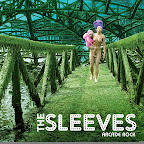1. Sex Museum
2. Kill Screen
3. Thursday Song
4. Walk With the Devil
5. She Said
6. Secret
7. Totalitarian Love Song
8. Stockholm
9. Truth
10. Weekend
11. Ball & Chain
12. Mirror
Ah, The Sleeves…In the interest of full disclosure, I must profess to being profoundly biased towards the band, since they were one of the very first I happened to hear here a couple of years ago (at an Underground event too!). But it’s not nostalgia that created the soft spot in my mind- it was the fact that against a background of the compressed, airbrushed sound of bands that prefer the flashy technocracy of metal, and rock since the 80s in general, the Sleeves sounded like they’d looted their amps from some musical treasure stowed away by a 70s punk band, only to be discovered by true believers after making their way through a labyrinth guarded by a Mino-TommyLee (why do you think Cleveland’s RnR Hall of Fame is shaped like a pyramid?…And yes, I know that didn’t make sense. But Egypt had a whole lineage of Greek kings, so there.). They were never ashamed, to my ken, of the solid state-ness of their amps, and that manifested itself in their raucous and (to some extent) raunchy proto-punk-like style. But, that approach has a trapdoor built into it – often, when stripped of the atmosphere of the live show, the music can sound like mere rehashing. There have been two broad, equally valid, remedial approaches for this malady; to either do an experimental or surprisingly new take on the good ol’ sound or to so embody the spirit of that sound so as to put paid to the “rehash” angle. The most obviously satisfying approach, to me, is to figure out a way to combine the two approaches with a critical ear and a fan’s heart; Arcade Rock tries exactly this approach and the results are a delight.
The guitar texture of choice throughout the album is a warmly abrasive punch of distortion, much like Dave Davies’ ‘fart-box’ (which raises the question of whether knitting needles were involved), which effectively recreates the late 60s-early 70s raw bluesy-hangover feel, which (like all the first great punk bands) they then speed up to get the adrenalin up. This is contrasted by the rather purposefully demure bass, much more akin to The Electric Prunes than Glen Matlock; the looping, deliberate, almost-disorienting bass lines contrast the rawness of the guitars perfectly. The drums, though strongly rooted in the rock style, on warranted occasions, move towards tribal toms without being dogmatic or formulaic in either; together, the layer of intrigue added by the rhythm section is agreeably complementary to the guitars. To top it off the lead guitars (which, I’m guessing, were all played by now ex-guitarist Bee) are a sort of minimalist blues, cynical yet joyous, like Arthur Lee (Love) mixed with Scott Kempner (Dictators/Del-Lords). This attempt feels contrived at certain points, but all things considered I’d rather that this approach be tried than not because of the value of the results.
The album’s starter (for 10) is probably the song they’re most known for, Sex Museum. Perhaps it’s my ears, but I’m used to singer/guitarist Keith sounding slightly deeper live than he does on the album. Still, the Clint Conley mixed with Greg Sage tone of voice on the album is well suited to the songs. The psychedelic punk sort of feel on Sex Museum is helped immensely by the lyrics, which tend not to use common truisms (which is actually true for most songs) creates a palpable semi-tribal atmosphere and gets the proverbial engine running immediately. Kill Screen a fairly conventional rock song by sound uses a clever lyrical approach, by taking a few gaming-related phrases and using them to track a life-lesson – well done, sirs! Walk With the Devil opens with an ‘old-blues-man’s’ lament but moves quickly into a 90s rock song (to my slight disappointment). She Said features a very 60s R&B sound, and is seemingly composed with mindset of loving R&B, 60s girl-groups and the Who/Zeppelin sandpaper-soul sound that Joey Ramone used to write songs with; indeed, it is easy to hear him singing this song (and the fact that it ends with the Rock ‘n’ Roll Radio drumbeat is telling). Totalitarian Love Song, possibly their best song, comes out gloriously here; a great combination of a large number of their collective influences that is worthy of The Replacements. Additionally, the lyrics play with the meter so as to force one to pay attention to the concluding syllable of the line (a very common thing people don’t notice about their listening habits), which I always like. Weekend is a surprisingly jazzy rock song, evocative of the Chili Peppers during their Californication phase. Ball and Chain is a particularly glorious punky number with some comically odd lyrics (read the sheet), and the album closes very strongly with Mirror. The cameo from Ivy Fernie (from local band Dark Himaya) really helps; the song calls for significant vocal power, and while perfect singing is NOT the objective of rock, it’s good to get it in there somewhere.
While certain songs are blotted by lack of ingenuity (Secret) or a more formulaic approach than on the rest of the album (Stockholm, Truth), these are not worth expounding upon. The songs are largely inventive and fresh-sounding, and all are listenable. The variety shown on the album bodes very well for the band’s future, and is a great culmination of a couple years’ work. If you like ROCK music, of whatever kind, this album deserves a listen because it’s rootsy yet new, in a great way; if you’ve only ever seen the band live, it deserves a listen because this shows a more regimented side of the band with great results. In either case, it is a Sweet Thing.
— Shashwati Kala


















